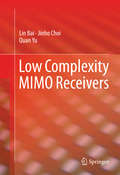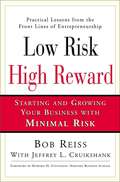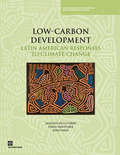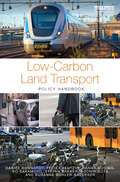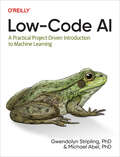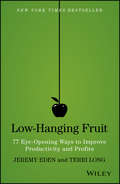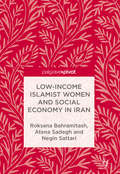- Table View
- List View
Low Code und Citizen Development für eine erfolgreiche Digitalisierung: Eine Einführung für Fach- und Führungskräfte
by Christoph Baumgarten Edona Elshan Rainer EndlAn Ideen für digitalgestützte Innovationen mangelt es in Unternehmen selten. Und doch kommt die Digitalisierung häufig nicht voran: Für disruptive Geschäftsmodelle oder neuartige Geschäftsprozesse sind innovative Ansätze in der Softwareentwicklung erforderlich. Oft stehen Organisationen vor der Herausforderung, mit begrenzten IT-Kapazitäten individuelle Lösungen zügig und ökonomisch zu entwickeln. Der hier vorgestellte Low-Code-Ansatz weist einen Weg aus diesem Dilemma: Er stellt Methoden und Werkzeuge zur Verfügung, die auch Nicht-Informatiker*innen die Entwicklung professioneller Software erlauben. Das Buch bietet einen umfassenden Überblick über Low-Code-Technologien, stellt das für ein Low-Code-getriebenes Citizen Development benötigte Basiswissen bereit und leitet an, wie Citizen Development in Unternehmen etabliert und gesteuert wird. Es zeigt Fach- und Führungskräften neue Wege auf, ungenutztes Potenzial für die digitale Transformation freizusetzen.
Low Complexity MIMO Receivers
by Lin Bai Jinho Choi Quan YuMultiple-input multiple-output (MIMO) systems can increase the spectral efficiency in wireless communications. However, the interference becomes the major drawback that leads to high computational complexity at both transmitter and receiver. In particular, the complexity of MIMO receivers can be prohibitively high. As an efficient mathematical tool to devise low complexity approaches that mitigate the interference in MIMO systems, lattice reduction (LR) has been widely studied and employed over the last decade. The co-authors of this book are world's leading experts on MIMO receivers, and here they share the key findings of their research over years. They detail a range of key techniques for receiver design as multiple transmitted and received signals are available. The authors first introduce the principle of signal detection and the LR in mathematical aspects. They then move on to discuss the use of LR in low complexity MIMO receiver design with respect to different aspects, including uncoded MIMO detection, MIMO iterative receivers, receivers in multiuser scenarios, and multicell MIMO systems.
Low Cost Carriers: Emergence, Expansion and Evolution
by Lucy Budd Stephen IsonLow cost carriers (LCCs) represent one of the most exciting and dynamic yet often contentious developments in recent commercial aviation history. Formed as a direct result of policies of airline deregulation and liberalisation that were initiated in the United States in the late 1970s before being implemented in certain European, Australasian, Latin American and other world markets from the mid-1990s onwards to encourage competition, LCCs have been responsible for progressively reconfiguring the spatial patterns, operational practices and passenger experiences of flight. In the process, they have enabled growing numbers of people to fly to more places, more frequently, and at lower cost than had been previously possible. In so doing, however, they have generated a number of socio-economic and environmental challenges. The 23 essays included in this volume provide a detailed insight into the emergence, expansion and evolution of the low cost carrier sector worldwide. The volume covers deregulation and liberalisation of the global airline sector, the business models and operating characteristics of low cost carriers, the changing nature of the airline/airport relationship, LCC network characteristics, issues of pricing and competition and the current impacts and likely future trajectories.
Low Performer und schwierige Mitarbeiter erfolgreich führen: Die 5 Faktoren einer effektiven Führungskommunikation mit dem KLARA-Prinzip
by Pascal Croset Markus DoblerSchwierige Mitarbeiter, Low Performer, Schlechtleister – alles sehr unschöne Begriffe, die suggerieren, dass die Ursachen ausschließlich beim Mitarbeiter liegen. In diesem Fachbuch betrachten die Autoren Minderleistung aus arbeitspsychologischer Sicht, gehen den vielfältigen Ursachen auf den Grund und klären die arbeitsrechtlichen Grundlagen. Im Laufe ihrer jahrelangen Zusammenarbeit mit Führungskräften und Mitarbeitern haben die Autoren fünf immer wieder auftauchende Problem- bzw. Themenfelder in der Führung herausgearbeitet und daraus das KLARA-Prinzip entwickelt. KLARA steht für:KlarheitLösungsorientiertheitAchtsamkeitRespektAnpassungs-Konsequenzund beschreibt die wichtigsten Grundprinzipien einer erfolgreichen Führungskommunikation. Praxisnahe Beispiele erleichtern Führungskräften die Umsetzung in den eigenen Berufsalltag.
Low Risk, High Reward
by Bob ReissContrary to popular belief, most entrepreneurs don't like risk. While they are not afraid to take chances, the most successful entrepreneurs do what they can to anticipate, minimize, and offset risk at every opportunity, insists Bob Reiss, who in his own flourishing entrepreneurial career has managed to turn risk reduction into a science. Now this successful self-starter, whose exploits have been featured in The Wall Street Journal and have become case studies for Harvard Business School classes, shares the lessons of a lifetime. By following his own prescription for managing risk, and using real-life success stories from experienced entrepreneurs, Reiss covers every obstacle the entrepreneur is likely to encounter. Where do ideas come from and how do you get started? Where can you find money and expert advice? How do you hire the best people and build credibility? How do you get orders and reorders? How do you develop and introduce successful products? Should you go public? Through every step in the process, Reiss emphasizes how risk can be anticipated, managed, and significantly reduced. Full of practical suggestions and insights, this easy-to-read book is an indispensable guide for anyone thinking about starting a business and particularly for those would-be entrepreneurs without experience or much capital. It is equally valuable to entrepreneurs looking for ways to make their businesses more successful.
Low-Carbon Consumption in China: Residential Behavior, Corporate Practices and Policy Implication
by Bin Zhang Zhaohua WangThis book explores China’s low-carbon consumption in the context of residential behaviour, corporate practices and policy Implication. It first calculates the carbon and ecological footprints of residential consumption, including both direct and indirect emissions, before discussing Chinese residential behavioural aspects and determinants of electricity saving, low-carbon transportation, low-carbon product purchasing, and e-waste recycling. The authors then investigate the relationship between industrial growth and carbon emissions, using the example of the iron and steel industry to examine the motivation for energy intensive industries to reduce carbon emissions. They also consider energy efficiency and inter-company collaboration on carbon emission reduction. Lastly, the book describes the major low-carbon policies in China and their impact, economic cost and public acceptance.
Low-Carbon Development: Latin American Responses to Climate Change
by John Nash Augusto De la Torre Pablo FajnzylberThis book, the companion volume to 'Low Carbon, High Growth: Latin American Responses to Climate Change', examines some of the major threats posed by climate change to the region's economies, societies, and biodiversity. It describes the patterns of greenhouse gas emissions in the Latin America and Caribbean region and in specific countries, finding that the future trajectory could be increases in emissions relative to other regions. 'Low-Carbon Development' explains why it is in the region's best interest to participate actively in global efforts to reduce emissions and what type of global climate change architecture could allow the countries to make their most effective contributions. Finally, the book lays out an agenda for domestic policies and investments to help the countries adapt to climate change while reducing their emissions profiles. It will be useful to policy makers, civil society organizations, and researchers working in climate change.
Low-Carbon Land Transport: Policy Handbook
by Daniel Bongardt Felix Creutzig Hanna Hüging Ko Sakamoto Stefan Bakker Sudhir Gota Susanne Böhler-BaedekerPractical guide for transport policymakers and planners to achieve low-carbon land transport systems. Based on wide ranging research, it shows how policies can be bundled successfully and worked into urban transport decision-making and planning strategies. With case studies from developed and developing countries, it outlines measures for reducing emissions, tailoring these to specific circumstances. It also highlights how greenhouse gas savings are measured, as well as success factors for implementing policies and measures in complex decision-making processes. For students of sustainable transport, professional planners and decision makers, Low-Carbon Land Transport is an invaluable reference for all those looking to help transport networks flow in a sustainable direction.
Low-Code AI: A Practical Project-Driven Introduction to Machine Learning
by Gwendolyn Stripling Michael AbelTake a data-first and use-case–driven approach with Low-Code AI to understand machine learning and deep learning concepts. This hands-on guide presents three problem-focused ways to learn no-code ML using AutoML, low-code using BigQuery ML, and custom code using scikit-learn and Keras. In each case, you'll learn key ML concepts by using real-world datasets with realistic problems.Business and data analysts get a project-based introduction to ML/AI using a detailed, data-driven approach: loading and analyzing data; feeding data into an ML model; building, training, and testing; and deploying the model into production. Authors Michael Abel and Gwendolyn Stripling show you how to build machine learning models for retail, healthcare, financial services, energy, and telecommunications.You'll learn how to:Distinguish between structured and unstructured data and the challenges they presentVisualize and analyze dataPreprocess data for input into a machine learning modelDifferentiate between the regression and classification supervised learning modelsCompare different ML model types and architectures, from no code to low code to custom trainingDesign, implement, and tune ML modelsExport data to a GitHub repository for data management and governance
Low-Cost Living 2nd Edition: How to Live Well for Less Money
by John HarrisonWhen economic conditions are tough, we all need to watch our spending. John Harrison's simple, tried and tested methods will help you to enjoy a better standard of living while saving money and helping the environment.Discover the benefits of growing your own fruit and vegetables, raising chickens, making butter, cheese and bread, and brewing your own beer.Save energy, save on your bills.Harvest food for free and avoid waste.Play the supermarkets at their own game and get the best deals.See how to recycle, re-use, make do and mend.Find out if solar power is right for you and whether wind power makes domestic sense.
Low-Cost Living: Live better, spend less
by John HarrisonWhen economic conditions are tough, we all need to watch our spending. John Harrison's simple, tried and tested methods will help you to enjoy a better standard of living while saving money and helping the environment.Discover the benefits of growing your own fruit and vegetables, raising chickens, making butter, cheese and bread, and brewing your own beer.Save energy, save on your bills.Harvest food for free and avoid waste.Play the supermarkets at their own game and get the best deals.See how to recycle, re-use, make do and mend.Find out if solar power is right for you and whether wind power makes domestic sense.
Low-Cost, Low-Tech Innovation: New Product Development in the Food Industry (Routledge Studies in Innovation, Organizations and Technology)
by Vijay VyasLike much of SMEs research, innovation studies of small enterprises have commenced later and are less numerous. The focus of such studies remains high-technology enterprises, which continue to attract both academic and popular interest, oblivious to the innovative endeavours of people in traditional low-tech industries. This book attempts to address this imbalance through a comprehensive analysis of innovation in this largely neglected area. Based on case studies of seven small innovative food companies, this book presents an in-depth analysis of innovation in the Scottish food and drinks industry and unravels a lesser-known approach to effective low-cost product innovation, which is simple and economical, yet elegant and successful. Using careful data collection and rigorous statistical testing, the analysis and findings in this book address a wide spectrum of interests: academics in business schools, policy makers in governments and executives and entrepreneurs in food and other low-technology sectors.
Low-Hanging Fruit: 77 Eye-Opening Ways to Improve Productivity and Profits
by Terri Long Jeremy EdenA straightforward, valuable guide to reduce effort and raise profits Step inside any organization, even a very successful one, and you’ll probably find a lot of waste if you know where to look. From providing a feature that consumers don’t care about to exhausting efforts on tasks that only require adequate attention, there are countless areas where resources go down the drain. In Low-Hanging Fruit, Jeremy Eden and Terri Long provide seventy-seven of their most effective techniques for improvement, each drawn from their success working with major companies. For more than twenty years, Jeremy Eden and Terri Long have helped companies of all sizes make millions by harvesting their low-hanging fruit. In this practical guide, Eden and Long share valuable, refreshing insights in entertaining chapters that get straight to the point. This book shows you how to smoothly shift your approach, your priorities, and your mindset to reveal the hidden potential in your organization. Whether you are a member of a small team or a global executive, you will learn how to identify and solve hidden problems, improve productivity, and increase profits. Many people don’t realize that there are dozens of quick, easy, and affordable ways to make things better. Don’t buy into the myth that only some people have creative ideas. Typically, the people closest to the work (from the factory floor to the C-Suite) and the people closest to the customer know the best ways to improve business. We can pluck this “low-hanging fruit” every day to save time and money right away. Need to grow your company’s earnings but don’t know where to find the low-hanging fruit? The answer is right in front of you, but harvesting it takes skill. Eden and Long show you seventy-seven clever ways to discover possibilities and make meaningful changes. Low-Hanging Fruit shows you how to easily improve your job satisfaction, your team’s performance, and your company’s earnings.
Low-Income Islamist Women and Social Economy in Iran
by Roksana Bahramitash Atena Sadegh Negin SattariThis book presents an innovative analysis of the solidarity/social economy among low-income religious women in Iran. For years, the role of low-income women in community care and poverty reduction has been underestimated and under-researched in the broader academic community, due to the “invisible” nature of these informal and predominantly religious networks. As economic hardship in Iran increases, women in the community have mobilized to bring assistance to those struggling to make ends meet. The culmination of years of fieldwork in different parts of the country, this book sheds light on how religious women form the backbone of Iran’s social safety net as the welfare state fails and social protection policies dwindle.
Low-Paid EU Migrant Workers: The House, The Street, The Town (Bristol Studies in Law and Social Justice)
by Catherine Barnard Sarah Fraser Butlin Fiona CostelloAvailable open access digitally under CC-BY-NC-ND licence. This book offers an in-depth exploration of the lives of EU migrant workers in the UK following Brexit and COVID-19. Drawing on a longitudinal study, the book delves into the legal problems migrant workers face and sheds much-needed light on the hidden interactions between the law and communities around issues such as employment, housing, welfare and health. Through personal narratives and insights gathered from interviews, it reveals how (clustered) legal problems arise, are resolved and often bypass formal legal resolution pathways. This is an invaluable resource that provides a rich picture of everyday life for migrant workers in the UK and highlights the vital role of NGOs working to support them.
Low-carbon, Sustainable Future in East Asia: Improving energy systems, taxation and policy cooperation (Routledge Studies in the Modern World Economy)
by Hector Pollitt Soocheol Lee Park Seung-JoonEast Asia is a key region in the global economy, including both the second and third largest global economies already and, led by China, continuing to expand at a rapid rate. This economic growth has led to unprecedented gains in prosperity in the region but it has also led to increasing environmental pressures and energy issues. This book assesses ways in which East Asia can continue or even increase existing rates of economic growth while at the same time reducing greenhouse gas emissions and other environmental degradation. Using advanced modelling approaches, future scenarios for four East Asian countries are assessed in detail, including analysis of particular challenges in each country (e.g. coal power in China, nuclear power in Japan). Prospects for each country’s energy system are assessed in detail and the potential effects of various types of Environmental Tax Reform in the four countries are also considered carefully. The final section of the book explores the interaction between trade liberalization, a key driver of growth, and emission levels in the East Asia region.
Lowe's Transport Manager's and Operator's Handbook 2020
by David Lowe Clive PidgeonNow in its 50th edition, Lowe's Transport Manager's and Operator's Handbook 2020 is the most comprehensive guide available to the operational rules and guidelines governing the UK, Ireland and the EU's road transport operators. This best-selling handbook is an essential reference and explores in detail the most pressing issues in today's road transport industry. It includes details on professional competence, insurance, international transport of animals, dangerous and perishable goods, international haulage and customs procedures. This manual includes guidance for drivers in the Republic of Ireland and mainland Europe, along with the rules and penalties governing these regions.Lowe's Transport Manager's and Operator's Handbook 2020 is the essential reference source for any transport manager, fleet operator, owner-driver haulier or student involved in the transport industry. This new edition has been thoroughly updated and revised to reflect the latest developments, covering changes to EU drivers' hours, HM Customs, tachograph rules for AETR rules and intermodal freight material.
Lowe's Transport Manager's and Operator's Handbook 2021
by David LoweSupplementary Brexit Trade and Cooperation Agreement Content Available. See inside first page/back cover of the book for access details. Maintain your understanding of the rules governing road transport operators in the UK, Ireland and Europe to ensure the safe and legal operation of your fleet.Lowe's Transport Manager's and Operator's Handbook 2021 is the complete guide to the operational rules and guidelines governing the UK, Ireland and the EU's road transport operators. Written and designed for transport managers, fleet operators, owner-driver hauliers and those working in the sector, this book contains all the relevant and technical detail required to run a compliant, safe and efficient transport operation.Now in its 51st edition Lowe's Transport Manager's and Operator's Handbook 2021 remains an essential resource to stay informed on the most pressing issues facing the transport industry. It covers all aspects relating to goods vehicles and their operators from vehicle registration, maintenance and load management (including abnormal and dangerous loads) to professional competence, operator training and driver testing. Road traffic law is explained alongside how to ensure safety on the road and at work. Meeting operating standards, keeping up to date with the latest industry changes and complying with the law, all while running sustainable transport operations, has never been simpler with the help of this guide.
Lowe's Transport Manager's and Operator's Handbook 2022
by David Lowe Glen DaviesThe United Kingdom has experienced the biggest changes to its freight and transport regulations in a lifetime. Understand the complete rules and processes governing the UK's road transport operators with this guide, including those that have changed with Brexit. Lowe's Transport Manager's and Operator's Handbook 2022 offers a complete overview of the operational rules and guidelines governing the UK's road transport operator. This book contains all the relevant legal and technical information required to run a compliant, safe and efficient transport operation. It includes all the latest changes to the rules and processes, including those governing the transportation of goods between Great Britain and the EU following Brexit.This fully updated 52nd edition remains an essential resource for transport managers, fleet operators, owner-driver hauliers and those working in the sector. It covers all aspects relating to goods vehicles and their operators from vehicle registration, maintenance and load management (including abnormal and dangerous loads) to professional competence, operator training and driver testing. Road traffic law is explained alongside how to ensure safety on the road and at work. Meeting operating standards, keeping up to date with the latest industry changes and complying with the law, all while running sustainable transport operations, has never been simpler with the help of this guide.
Lowe's Transport Manager's and Operator's Handbook 2023
by Glen DaviesLowe's Transport Manager's and Operator's Handbook 2023 provides a complete overview of the operational guidance governing the UK's road transport operators.With the uncertainty of technological advancement, post-Brexit trade arrangements and various industry crises, it is essential for the UK's road transport operators to have a firm grasp of the processes, rules and regulations that govern their industry. This fully updated 53rd edition covers all aspects of transport legislation relating to goods vehicles and their operators from vehicle registration, maintenance and load management to professional competence, operator training and driver testing. Road traffic law is explained alongside how to ensure safety on the road and at work.Meeting operating standards, keeping up to date with the latest industry changes and complying with the law, all while running sustainable transport operations, has never been simpler with the help of Lowe's Transport Manager's and Operator's Handbook 2023. It is an essential resource for transport managers, fleet operators, owner driver haulers and those working in the industry looking to ensure operational stability and legislative compliance in a turbulent environment.
Lowe's Transport Manager's and Operator's Handbook 2024
by David LoweLowe's Transport Manager's and Operator's Handbook 2024 offers crucial guidance on changes within the transport and haulage industry, providing a clear and concise approach to complex rules, processes and regulations affecting practitioners within the sector.This fully updated 54th edition outlines important legal and technical information so that transport managers, fleet operators, hauliers and practitioners can ensure they remain compliant while navigating a continuously evolving sector. Covering the latest changes to UK guidelines, this indispensable guide includes an essential overview of new operational rulings, up-to-date regulatory decisions and key aspects of transport legislation. Lowe's Transport Manager's and Operator's Handbook 2024 is a vital source for those wanting to ensure professional competence and operational stability. From driver testing and training, road traffic law and vehicle maintenance to Brexit-led changes and technological advancements, this highly regarded guide remains an essential resource for ensuring the safe and efficient operation of today's transport industry.
Lowe's Transport Manager's and Operator's Handbook 2025
by David Lowe Ashley RimmerThis vital resource offers crucial guidance to complex rules, processes and regulations affecting the transport and haulage industry. Lowe's Transport Manager's and Operator's Handbook 2025 is a vital and respected source for those wanting to ensure professional competence and operational stability. From driver testing and training to road traffic law, this widely used guide remains an essential resource for ensuring the safe and efficient operation of today's transport industry. This fully updated 55th edition outlines important legal and technical information so that transport managers, fleet operators, hauliers and practitioners can ensure they remain compliant while navigating a continuously evolving sector. Covering the latest changes to UK guidelines, this indispensable guide includes an essential overview of new operational rulings, up-to-date regulatory decisions and key aspects of transport legislation.
Lower League Football in Crisis: Issues of Organisation and Legitimacy in England and Germany (Football Research in an Enlarged Europe)
by Daniel ZiescheWhile the field of football studies has produced an abundance of literature on professional, top-league football, there is little research output to do with the non-top level football. This book explores the relationship between the top and lower leagues, laying open the drastic schisms that exist between the different levels. The study links the developments at the top level of English and German football in the past 30 years to transformational processes in lower league football. Illustrating how the hegemonic status of top football weighs hard on the spheres below, it depicts how it also serves as a blueprint for lower league football clubs’ strategies in coping with a threefold dilemma of institutional legitimacy that shows itself in economic, cultural and social dimensions. Taking the different club structures in both national contexts as a starting point, it portrays both the efficacy of institutional frameworks and how these can be challenged from below. This research will be of interest to students and scholars across football studies, sports studies, the sociology of sport, and organisation studies.
Lower Taxes in 7 Easy Steps
by Stephen FishmanNot your typical tax-reduction book -- with this one, anyone can save on taxes!

